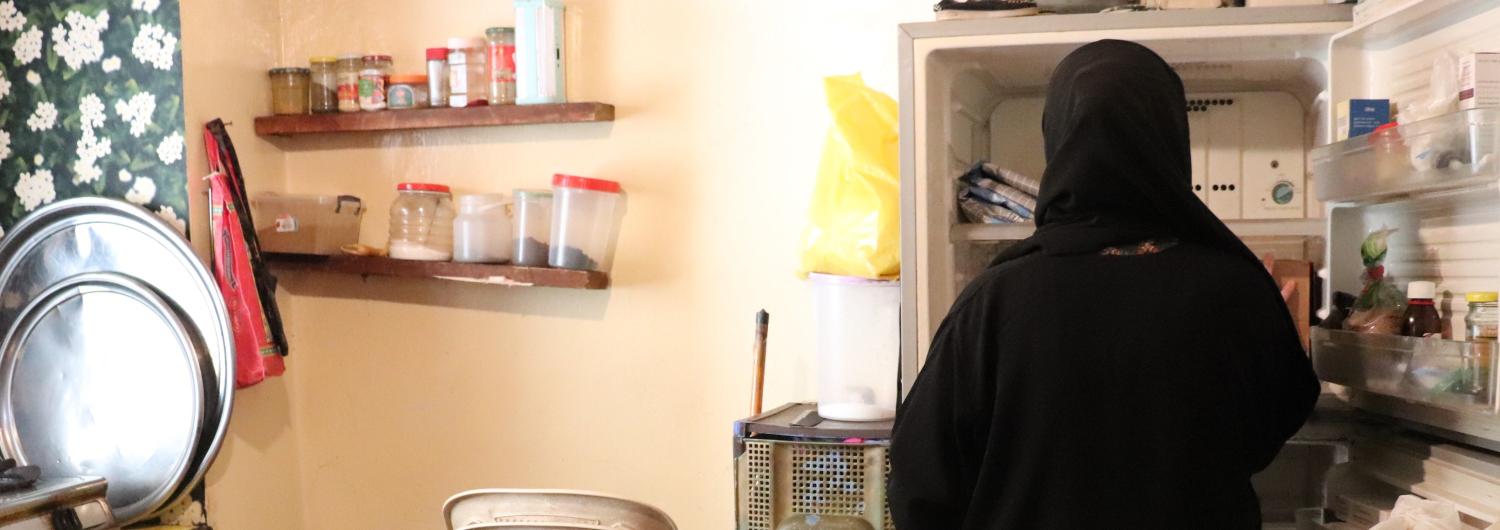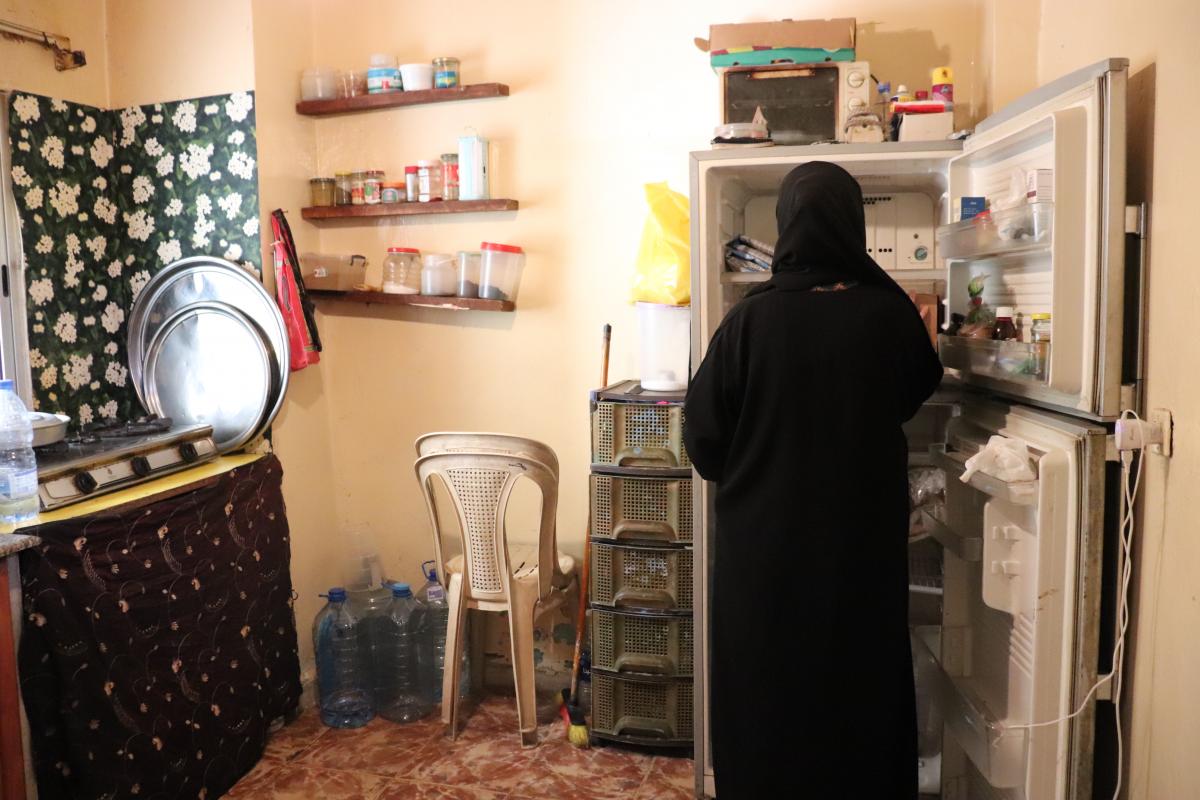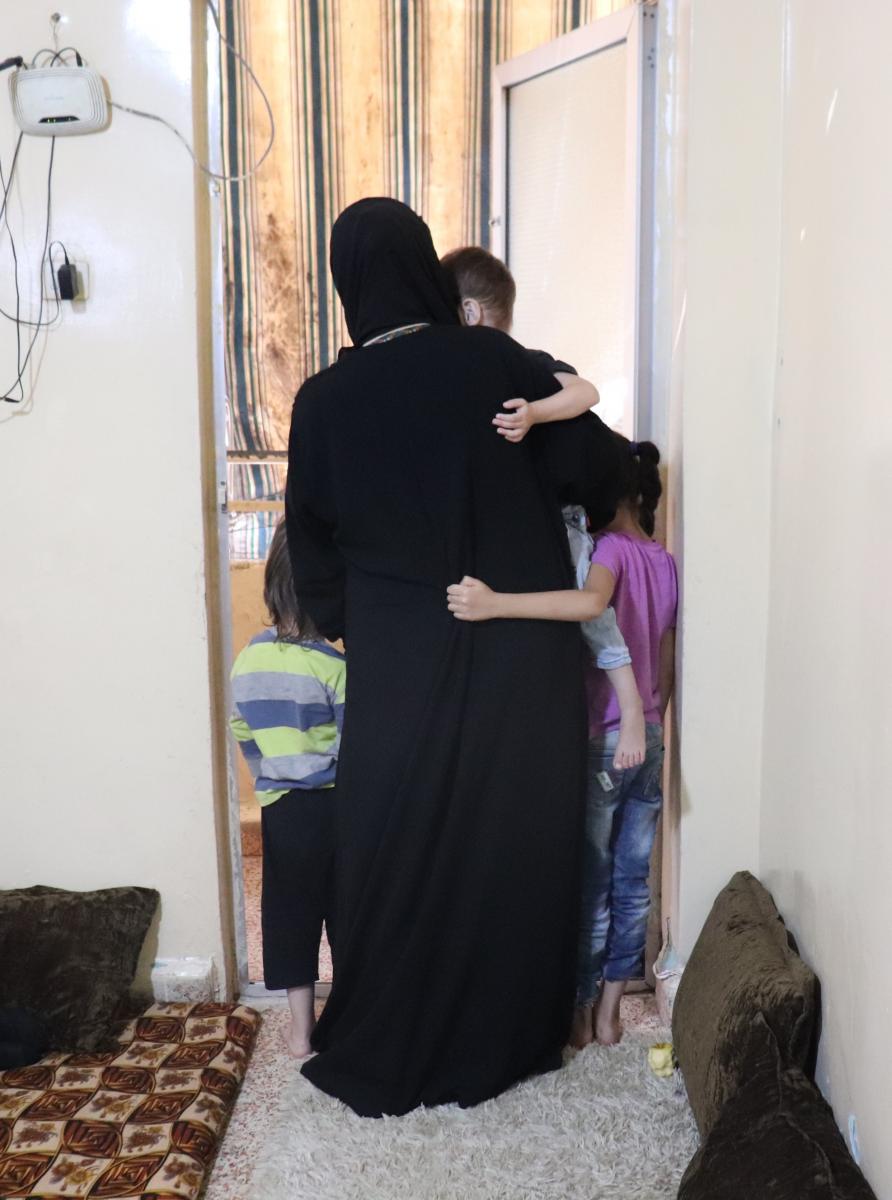Stories
Struggling to cover basic needs, the case of Amara and her family

Amara in her kitchen with a non-functioning fridge given the limited hours of electricity available a day in her house in Bourj Hammoud, one of the poorest neighborhoods in Beirut. (Elena Garcia Serra/Action Against Hunger)
Families in Beirut are living in critical conditions
Amara[i] is a 35-year-old Syrian woman that escaped the Syrian war. She now lives in a small apartment in Bourj Hammoud, Beirut with her husband and their 4 children who are 8, 7, 5 and 3 years old. The apartment barely has space for all of them. It contains two rooms with thin mattresses on the floor, as well as a kitchen and a bathroom equipped with basic furniture. Their situation has become very difficult for this family. Amara is not able to work since she takes care of the children, and her husband is also not able to work because of health issues that require treatment which they cannot afford.
Lebanon is currently hosting around 1,5 million Syrian refugees, and 200,000 Palestinians, being the country hosting the largest number of refugees per capita and per square kilometer[ii]. Nine out of ten Syrian refugees in Lebanon live in poverty, and they rely mostly on humanitarian aid for cash, food, and other basic needs[iii], just like Amara’s family.
She also explains that “Sometimes we take debt from my neighbors or relatives to buy food; they know our situation. Also, we have debt with the owner of the mini market”. As her case demonstrates, going into debt is one of the most common coping mechanisms used by Syrian refugee households in the country to survive, in 2021 92% of them resorted to borrowing money mostly to buy food (93%), to pay rent (49%), or to buy essential non-food items (34%), and medicines (34%)[iv].

Amara in her kitchen with a non-functioning fridge given the limited hours of electricity available a day in her house in Bourj Hammoud, one of the poorest neighborhoods in Beirut. (Elena Garcia Serra/Action Against Hunger).
Food security and means of living are no longer secure for an increasing number of vulnerable people in Lebanon. The overall economic situation in the country caused more than half of the Lebanese to now have an income below the poverty line and has doubled multidimensional poverty[i], reaching 82% in 2021 compared to 42% in 2019[ii]. The total inflation of food and (non-alcoholic) beverages reached 1874% between December 2019 and October 2021[iii] making the situation more difficult for those with no resources.
Amara buys low-quality rice, potato, bulgur, bread, and vegetables because they are cheaper. They are unable to buy any source of protein, r dairy products or fruit because they are too expensive, and they cannot store them in a safe manner due to lack of electricity. “For two days, one of my neighbors brought me apples and my children were so happy, they ate all the apples”, Amara says.
“There is not enough food available in the house. You know my child had malnutrition and we are barely eating. My children are always hungry, and they want to eat every 2-3 hours. Children cannot handle hunger. My husband and I eat only 2 meals a day, and we decrease the portions so my children can eat the quantity they need”. Just like Amara, 71% of Syrian refugees in Lebanon reduced their portion size in 2021, of meals, and 67% reduced the numbers of meals eaten per day, [iv].
Action Against Hunger is supporting families in distress like Amar’s
Action Against Hunger aims to alleviate the suffering of families like Amara’s through Food Security and Livelihoods interventions. During 2021, Action Against Hunger reached a total of 6,277 individuals (including 2,626 females) in Lebanon in this sector of intervention.
Together with the support of the French Embassy, Action Against Hunger developed nutrition activities, including infant and young child feeding promotion and distributed Multi-Purpose Cash Assistance to families that need it the most in Beirut. So far, under this program, 607 households have been reached, including approximately 3.035 individuals.

Amara with 3 of her 4 children in the small apartment where she lives in Bourj Hammoud, Beirut (Elena Garcia Serra/Action Against Hunger)
Amara also participated in the nutrition awareness raising activities and she said that they were useful, and she learned more about breastfeeding as well as what she should eat during pregnancy. Amara also learned a lot about malnutrition and how to use the mid-upper arm circumference tape: “After attending these sessions, every month, I am measuring the mid-upper arm circumference on my youngest child to make sure that he is okay and is eating well.” referring to her 3-year-old son that used to suffer from malnutrition, according to the mother. Malnutrition is a condition that occurs when the intake of energy or nutrients is deficient, excessive, or imbalanced (according to the World Health Organization[i]).
The family relies mostly on the Multi-Purpose Cash Assistance that the organization provides to them. They use it mainly to pay rent, electricity fees, and food. “Without cash assistance, for sure we will be evicted and sleeping on the streets.” - Amara says. However, the assistance is not enough for her family to cover all the basic needs and they still live in a very fragile situation. Given the protracted crises of the country, there is an increasing need of humanitarian assistance that ensures a sustainable support for families living in Lebanon like hers.
NOTES
[i] The Multidimensional Poverty Index produced by UNDP and the Oxford Poverty and Human Development Initiative, measures poverty by considering various deprivations experienced by people in their daily lives, including poor health, insufficient education, and a low standard of living.
[ii] UNESCWA, Multidimensional Poverty in Lebanon (2019-2021), September 2021. Available at: Multidimensional poverty in Lebanon (2019-2021): Painful reality and uncertain prospects - ESCWA (unescwa.org)
[iii] Lebanon Central Administration of Statistics, Economic Surveys, Inflation in figures. http://www.cas.gov.lb/index.php/economic-statistics-en
[iv] UNICEF, UNHCR, World Food Program (September 2021) Vulnerability Assessment of Syrian Refugees in Lebanon. Available at: https://reliefweb.int/attachments/bef919b5-a816-3b63-87b1-1c04cf8f01ce/VASyR%202021.pdf
[i] Aliases are used for the interviewees instead of their real names to protect their identities.
[ii] UNCHR, Lebanon at a glance. UNHCR Lebanon at a glance – UNHCR Lebanon
[iii] UNICEF, UNHCR, World Food Program (September 2021) Vulnerability Assessment of Syrian Refugees in Lebanon. Available at: https://reliefweb.int/attachments/bef919b5-a816-3b63-87b1-1c04cf8f01ce/VASyR%202021.pdf
[iv] UNICEF, UNHCR, World Food Program (September 2021) Vulnerability Assessment of Syrian Refugees in Lebanon. Available at: https://reliefweb.int/attachments/bef919b5-a816-3b63-87b1-1c04cf8f01ce/VASyR%202021.pdf
[i] WHO, April 2022. Malnutrition, World Health Organization. Available at Malnutrition (who.int)
JOIN US
Donate now
Your donation will reach those who most need it
Become a member
Join the generation that can bring an end to hunger
Donate via SMS
send HAMBRE to:
- 28010(1.2€)
- 38010(6€)
- 38012(3€)
Full donation to our projects. Valid for Movistar, Vodafone, Orange and Yoigo